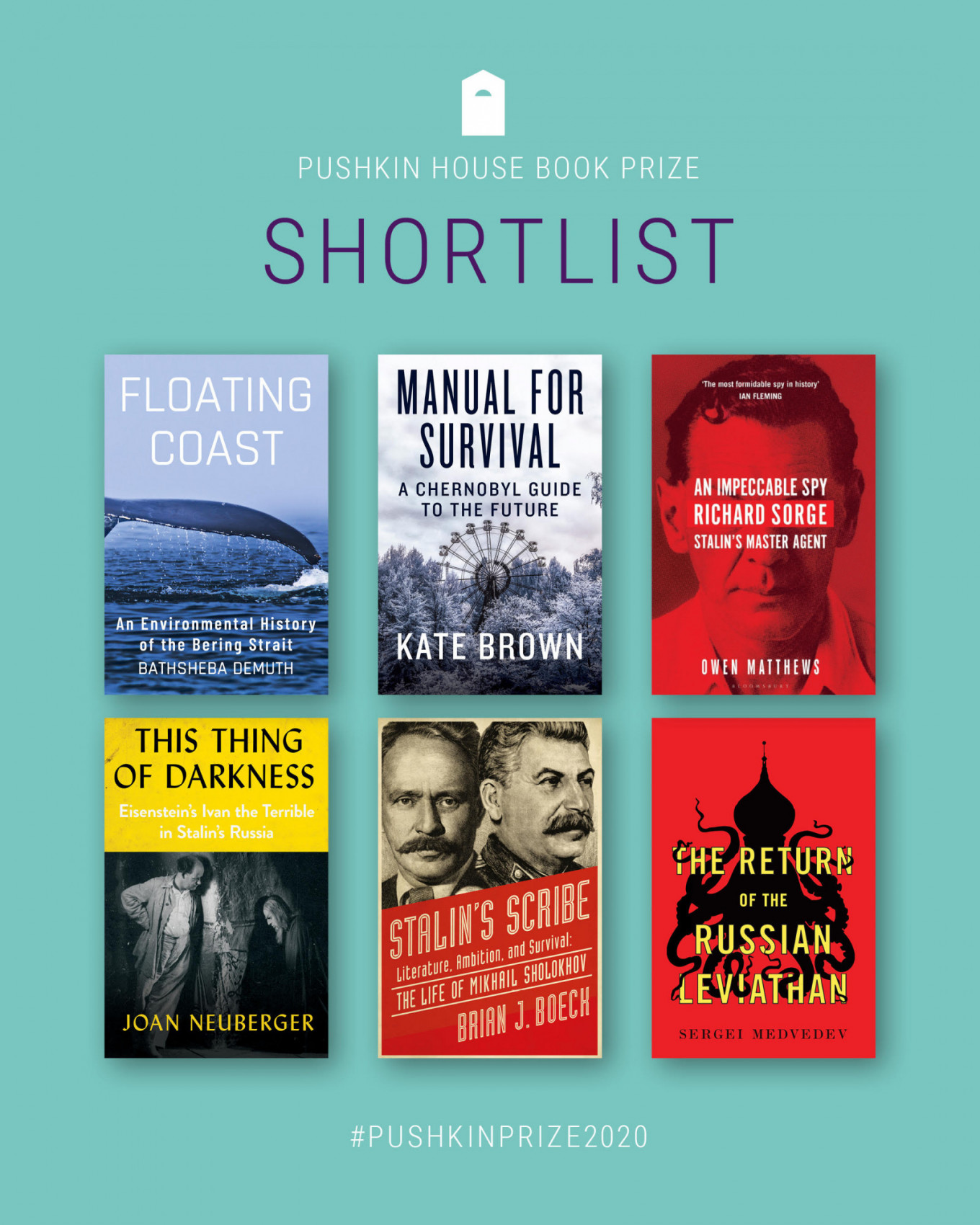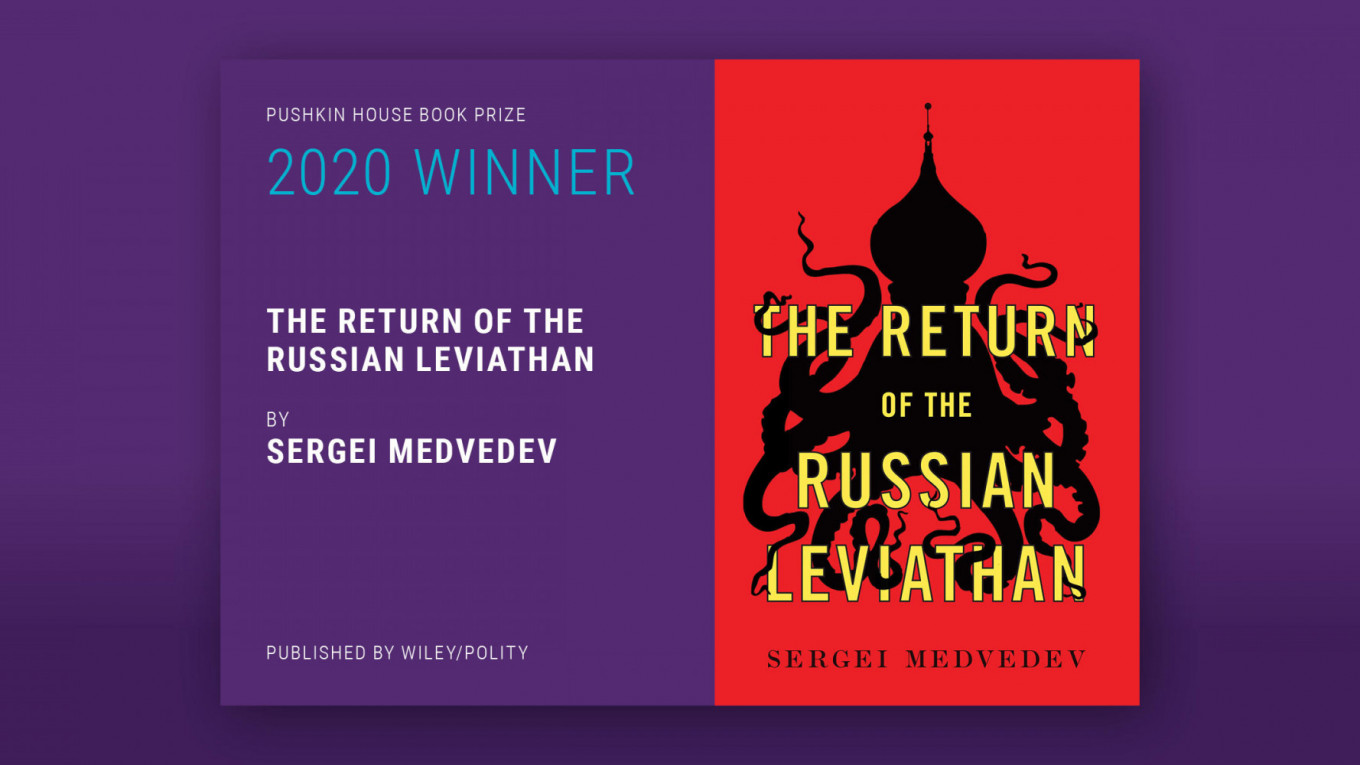On Thursday evening Pushkin House announced that Sergei Medvedev is this year’s winner of the 2020 Pushkin House Book Prize for his collection of essays called in English “The Return of the Russian Leviathan.” The book was translated by Stephen Dalziel.
The prize, which carries a monetary award of £10,000, is given every year for the best non-fiction book in English on Russia or the Russian speaking world. It is the only award in the world that recognizes non-fiction from and about Russia.
This was the first time the prize had been awarded to an author who lives and works in Russia.
Jury head Serhii Plokhy, a professor of Ukrainian history at Harvard University and a two-time winner of the prize, said that Medvedev’s book “brings together politics, sociology, psychology and other disciplines and approaches to place the politics of today’s Russian leadership in the long-running continuum of Russian history, culture and mentality. Sergei Medvedev is not just a first-rate scholar and thinker; he is also a talented writer. If you are looking for one book to help you understand today’s Russia and its government, we recommend this book."

Due to the coronavirus pandemic, the usual awards dinner and ceremony in London was not held, and Sergei Medvedev told The Moscow Times that he “enjoyed the news from the comfort of my own work desk.” He said further that he hadn’t expected it given the “high level of the competition… books with such deep historical insights.”
“I feel very lucky to be the first Russian national living in Russia to receive the award,” he said. “I take special pride in this; it’s very important to me that I live in Russia and that I’m still able to say what I say and think what I think while living in Russia.”
Medvedev said the award was a “recognition of the globalization of the intellectual marketplace and the importance of Russia for the Western reader… it shows the great interest in what’s happening in Russia and in political thought about Russia. The book is critical, but humorous, because you can only write about what has happened in the Russia over the past two decades with a good sense of humor…. It’s a nation living in its past, like a person who is trying to walk forward with his head turned backwards. It’s always a comical view, and I tried to convey that in my book.”
Douglas Smith and Stephanie Ellis-Smith, funders of the prize, said that even among the many good books recently published about Russia in the age of Vladimir Putin, “the book reads like a bright flash of light in the dark, but that is what Sergei Medvedev has produced with his stunningly original and illuminating book… This is just the sort of writing The Pushkin House Russian Book Prize was created to celebrate.”

This year the six books shortlisted out of an initial selection of more than 50 volumes covered topics ranging from ecology in the artic to a World War II spy. The other five nominated books were “Stalin’s Scribe: The Life of Mikhail Sholokhov” by Brian Boeck (Pegasus); “Manual for Survival: A Chernobyl Guide to the Future” by Kate Brown (W. Norton); “Floating Coast: And Environmental History of the Bering Strait” by Bathsheba Demuth (W. Norton); “An Impeccable Spy: Richard Sorge, Stalin’s Master Agent” by Owen Matthews (Bloomsbury); and “The Thing of Darkness: Eisenstein’s Ivan the Terrible in Stalin’s Russia,” by Joan Neuberger (Cornell University Press).
In addition to Serhii Plokhy, the other members of the panel of judges this year were Celestine Bohlen, a former Moscow correspondent who teaches journalism at Science Po in Paris; Julia Safronova, associate professor and chair, Department of History of European University at St. Petersburg University; and Richard Wright, Visiting Research Fellow at King’s College London, and former EU Ambassador to the Russian Federation and Director of the UN Agency for Palestine refugees.
It’s rare to come across [a book] that reads like a bright flash of light in the dark… This is just the sort of writing The Pushkin House Russian Book Prize was created to celebrate.
The prize was first awarded in 2012. This year the prize has been doubled to £10,000 “in reflection of the increasing importance of showcasing, rewarding and encouraging original, insightful and well-written books on Russia and encouraging public understanding and intelligent debate about the country and its culture.” The prize is funded by Douglas Smith, his wife Stephanie Ellis-Smith, and Marc Polonsky, trustee of The Polonsky Foundation. Polonsky offered his congratulations to Sergei Medvedev and noted that once again "the Pushkin House Book Prize has demonstrated the calibre and variety of contemporary writing about Russia.”
The Pushkin House was founded in 1954 as an independent, non-political venue for the support of Russian culture. It is a UK registered charity that conducts a rich program of events on Russian literature, art, music, history and society.
For more information about the Pushkin House, the Book Prize, and other activities, see the site.
For more information about Sergei Medvedev and his book, see the publisher's site.
A Message from The Moscow Times:
Dear readers,
We are facing unprecedented challenges. Russia's Prosecutor General's Office has designated The Moscow Times as an "undesirable" organization, criminalizing our work and putting our staff at risk of prosecution. This follows our earlier unjust labeling as a "foreign agent."
These actions are direct attempts to silence independent journalism in Russia. The authorities claim our work "discredits the decisions of the Russian leadership." We see things differently: we strive to provide accurate, unbiased reporting on Russia.
We, the journalists of The Moscow Times, refuse to be silenced. But to continue our work, we need your help.
Your support, no matter how small, makes a world of difference. If you can, please support us monthly starting from just $2. It's quick to set up, and every contribution makes a significant impact.
By supporting The Moscow Times, you're defending open, independent journalism in the face of repression. Thank you for standing with us.
Remind me later.







